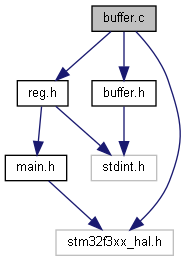 |
iSensor-SPI-Buffer
1.15
Firmware for the iSensor-SPI-Buffer board to enable full throughput buffered data capture on Analog Devices IMUs
|
 |
iSensor-SPI-Buffer
1.15
Firmware for the iSensor-SPI-Buffer board to enable full throughput buffered data capture on Analog Devices IMUs
|
iSensor-SPI-Buffer buffer implementation More...

Functions | |
| static uint8_t buf[BUF_SIZE] | __attribute__ ((aligned(32))) |
| uint32_t | Buffer_Can_Add_Element () |
| Checks if an element can be added to the buffer. More... | |
| uint8_t * | Buffer_Take_Element () |
| Take a single element from the buffer. More... | |
| uint8_t * | Buffer_Add_Element () |
| Add an element to the buffer. More... | |
| void | Buffer_Reset () |
| Clears the buffer data structure. More... | |
Variables | |
| uint32_t | g_bufLastRegIndex |
| uint32_t | g_bufCount = 0 |
| uint32_t | g_bufNumWords32 |
| static volatile uint32_t | buf_head = 0 |
| static volatile uint32_t | buf_tail = 0 |
| static uint32_t | buf_increment = 64 |
| static uint32_t | buf_replaceOldest = 0 |
| static uint32_t | buf_maxCount |
| static uint32_t | buf_lastEntryIndex |
iSensor-SPI-Buffer buffer implementation
Copyright (c) Analog Devices Inc, 2020 All Rights Reserved.
|
static |
The buffer storage (aligned to allow word-wise retrieval of buffer data)
| uint8_t* Buffer_Add_Element | ( | ) |
Add an element to the buffer.
New elements always get added to the head of the buffer, in both buffer modes. If the buffer is full and ReplaceOldest is set to true, then the head continues moving through the buffer memory. If replace oldest is set to false, the head stays still when the buffer data structure reaches capacity.
| uint32_t Buffer_Can_Add_Element | ( | ) |
Checks if an element can be added to the buffer.
The return value depends on the replace oldest setting and buffer count
| void Buffer_Reset | ( | ) |
Clears the buffer data structure.
This function resets the buffer to its default state. All stored buffer entries are discarded. The buffer control registers (buffer length, buffer config) are both validated to ensure the buffer is initialized to a valid state.

| uint8_t* Buffer_Take_Element | ( | ) |
Take a single element from the buffer.
In FIFO mode (queue) this function takes from the tail and moves the tail pointer down. This function is called from the main loop when a buffer dequeue is requested. As such, the ISRs are disabled for the duration of this function execution to prevent issues with g_bufCount being inadvertently changed
|
static |
Index within buffer array for buffer head
|
static |
Increment per buffer entry. This is buffer length + 4, padded to multiple of 4
|
static |
Position at which buffer needs to wrap around
|
static |
Buffer max count (determined once when buffer is initialized)
|
static |
Buffer full setting (0 -> stop adding, Not 0 -> replace oldest)
|
static |
Index within buffer array for buffer tail
| uint32_t g_bufCount = 0 |
Number of elements currently stored in the buffer. Global scope
| uint32_t g_bufLastRegIndex |
Index for the last buffer output register. This is based on buffer size. Global scope
| uint32_t g_bufNumWords32 |
Number of 32-bit words per buffer entry. Global scope